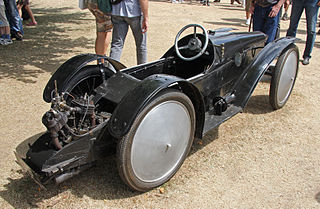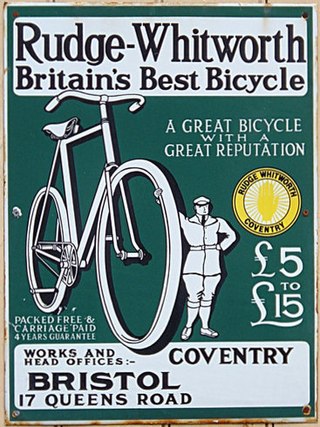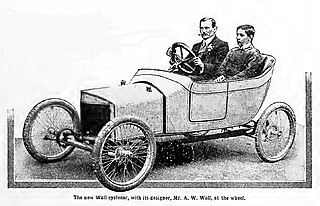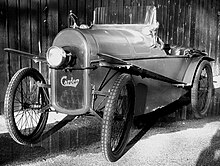
Tiny was a British cyclecar manufactured by Nanson, Barker & Co at Esholt, Yorkshire between 1912 and 1915.
The Calthorpe Motor Company based in Bordesley Green, Birmingham, England, made a range of cars, motorcycles and bicycles from 1904 to 1932.

The AV was a British cyclecar manufactured by Ward and Avey in Somerset Road, Teddington Middlesex between 1919 and 1924.

Coventry Premier Limited owned a British car and cyclecar manufacturing business based in Coventry from 1912 to 1923. It changed its name from Premier Cycles to Coventry Premier Ltd in November 1914.

The New Hudson Cycle Co. was originally started in 1890 by George Patterson, and manufactured 'safety' bicycles in Birmingham. In 1903 they produced their first motorcycle, but times became tough for Patterson after one of his sons died in WW1 and the other lost a leg. The family sold the factory to HJ Bructon after WW1, and in 1920 the company was reformed as New Hudson Ltd.
The Xtra was an English three-wheel cyclecar launched at the Olympia show in November 1921 and built until 1924 by Xtra Cars, Ltd., of London Road, Chertsey, Surrey.

Rudge Whitworth Cycles was a British bicycle, bicycle saddle, motorcycle and sports car wheel manufacturer that resulted from the merger of two bicycle manufacturers in 1894, Whitworth Cycle Co. of Birmingham, founded by Charles Henry Pugh and his two sons Charles Vernon and John, and Rudge Cycle Co. of Coventry.

The GN was a British cyclecar made in London, between 1910 and 1925, The name derived from its founders, H.R. Godfrey and Archibald Frazer-Nash. Production ceased in 1923 but the company kept trading until 1925.

Douglas was a British motorcycle manufacturer from 1907 to 1957 based in Kingswood, Bristol, owned by the Douglas family, and especially known for its horizontally opposed twin cylinder engined bikes and as manufacturers of speedway machines. The company also built a range of cars between 1913 and 1922.
The Perry was a British car made by the Perry Motor Company based in Tyseley, Birmingham who made cars between 1913 and 1916.

The Tamplin was an English automobile manufactured by Tamplin Motors from 1919 to 1923 in Kingston Road, Staines, Middlesex and from 1924 to 1925 in Malden Road, Cheam, Surrey.

The Ruby Cycle Co Ltd. was a British motorcycle manufacturer based in Ancoats Manchester. Founded in 1909 the factory produced a range of motorcycles under the Royal Ruby brand until 1932.
The Dewcar was a British four-wheeled cyclecar made from 1913 to 1914 by D.E.W. Engineering Co Ltd of Eynsford, Kent. The car was designed by Harold E. Dew and was developed through a series of one-offs starting in 1910.

For the pre World war I British Richardson cyclecar made in Lincolnshire see Richardson.

The Little Midland or LM was a British 4-wheeled cyclecar made from 1910 to 1922 by the Little Midland Light Car Co Ltd in various places in Lancashire.
Crescent Motors Ltd manufactured a cyclecar in Walsall and Birmingham between 1911 and 1915.
Duocars Ltd of 70 York Street, London was a maker of cycle cars founded in 1910. The cars were built in Alpha Street, Deptford, London. The company was founded by Mr L.F. de Peyrecave.

The Autocrat was a British car manufacturer operating from 1913 to 1926. The company operated from premises in the Balsall Heath area of Birmingham. Unusually for the time the company seems to have been run by two women, Ivy Rogers and Miss Howell.
F. E. Baker Ltd was a British motorcycle engine and cyclecar engine manufacturer based in the Precision Works, Moorsom Street, Birmingham, England. Founded in 1906 by Frank Edward Baker, the company produced motorcycle engines under the Precision trademark until 1919. Precision engines were used by a wide range of motorcycle manufacturers in the United Kingdom and in other parts of the Commonwealth and were also used in cyclecars. Many manufacturers used the 'Precision' trademark as part of their model names, and in 1912 there was a 'Precision' motorcycle sold in Australia, but it is unclear if this was manufactured by F. E. Baker or just permitted use of the trademark by a motorcycle manufacturer.

Arthur William Wall was an engineer in the field of motorised transport and inventor of the self-powered wheel in England in the early 20th century. He is best known for his creation of the self-powered wheel, the Wall Autowheel, which could be used to power a bicycle, but he was also the man behind Roc motorcycles and a tricar and four-wheel cyclecar. His main company was A. W. Wall Ltd, but he created several other companies to compartmentalise his different activities, such as the Roc Gear Co, who supplied epicyclic gears to a significant number of manufacturers before WW1.















